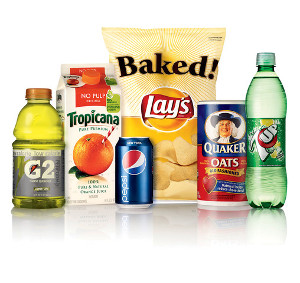 nc reported higher-than-expected quarterly earnings on Wednesday, as sales of Frito-Lay snacks, Quaker Oats and other food products grew at a faster pace than its beverage business.
nc reported higher-than-expected quarterly earnings on Wednesday, as sales of Frito-Lay snacks, Quaker Oats and other food products grew at a faster pace than its beverage business.Even so, the company said it is staying with its full-year profit outlook, reaffirming an earlier forecast for 7 percent growth. It said it was taking a conservative view because of the potential impact of global volatility and possible increases in spending on advertising and research and development.
"The world remains a volatile place and we may also choose to incrementally invest in additional long-term value-building initiatives," said Chief Financial Officer Hugh Johnston during a conference call after the results.
Johnston used the occasion to defend PepsiCo's current model of selling both snacks and drinks. In addition to co-marketing opportunities and added leverage with retailers, a broad portfolio serves as a hedge, he told CNBC television.
"When it's hot, Gatorade sells," he said, adding that when it is cold, Quaker oatmeal sells.
His remarks came a week after activist shareholder Nelson Peltz urged the company to buy Mondelez International Inc , which makes Oreo cookies, and to split off PepsiCo's soft-drink business.
"We think PepsiCo as a portfolio is working so well right now," Johnston said on CNBC. "The complexity of taking on an $80 billion acquisition and somehow trying to do all that integration, frankly, will distract the business from doing what it is that we're doing right now, which is creating a lot of value for shareholders."
PepsiCo shares, which had gained 26 percent this year, were down 0.4 percent at $85.81 in afternoon trade.
While it has no current plans to separate its global beverage business, the company is weighing "all options" for the North America business. Johnston declined on Wednesday to say what those options were, but analysts have said they could include selling or spinning off the business, or refranchising the bottling assets to independent distributors.
PepsiCo said it would give an update on its strategy early next year, declining to push it forward because of pressure from Peltz.
Strength In Food
Net income rose to $2.01 billion, or $1.28 a share, in PepsiCo's second quarter ended on June 15, from $1.49 billion, or 94 cents, a year earlier.
Excluding items such as restructuring and integration charges, earnings came in at $1.31 a share. On that basis, analysts on average had expected $1.19 a share, according to Thomson Reuters I/B/E/S.
Net revenue rose 2 percent to $16.81 billion, topping analysts' estimate of $16.79 billion.
Sales volume rose 3 percent for the food business and 1.5 percent for the beverage business. Volume tracks the amount of product sold.
"It seems like beverages have slowed down a little bit, so to have that snack offset is really nice right now," said Edward Jones analyst Jack Russo. "And that's where you really get the benefit with lower commodity costs."
Dr Pepper Snapple, which only sells drinks, also released results on Wednesday, saying profit fell on weak sales volume. Its shares were down 2.8 percent at $46.33. Last week Coca-Cola posted disappointing sales, blaming the weather.





